Lecture 12 The Role of Government in Tourism

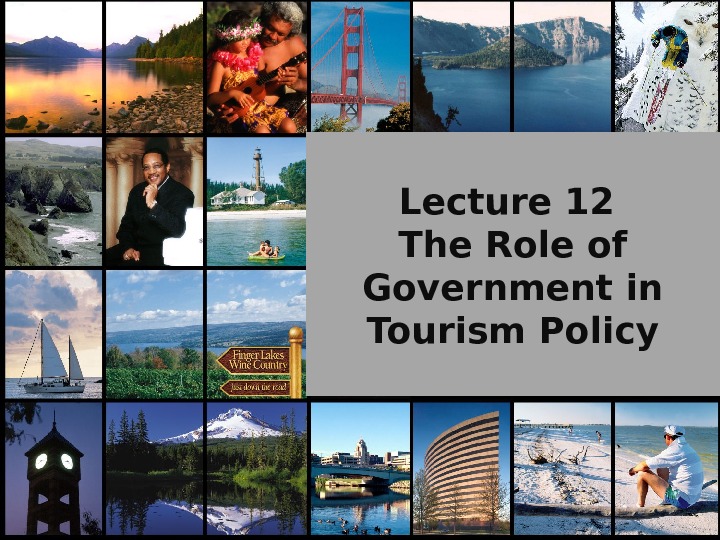
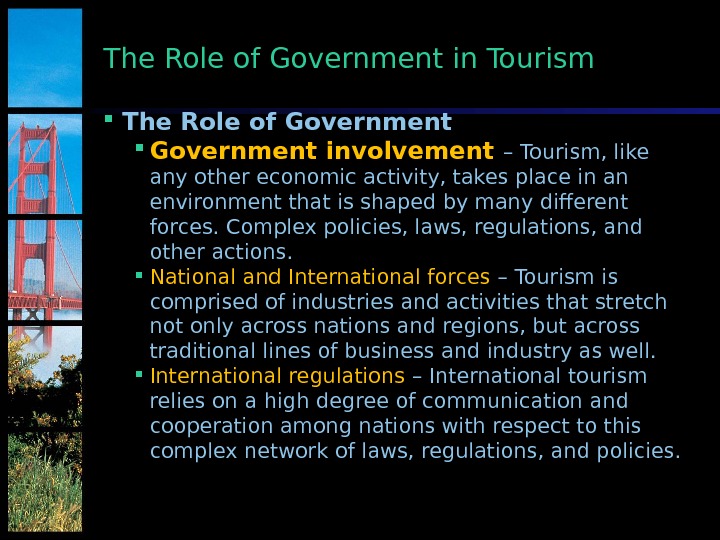
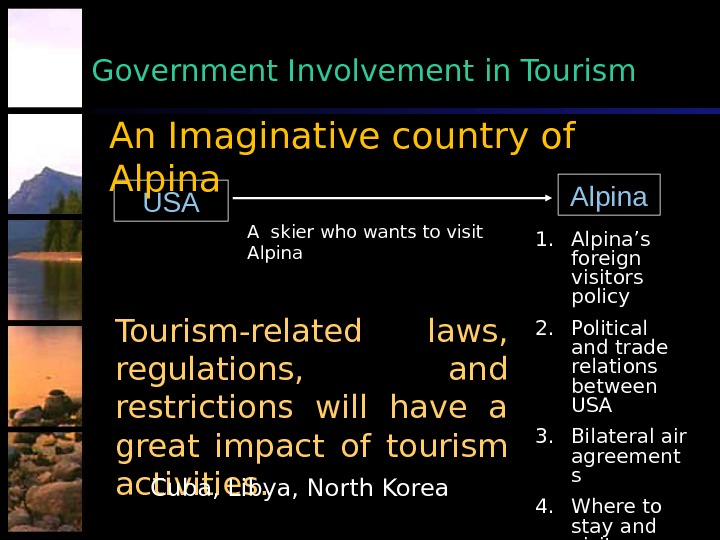
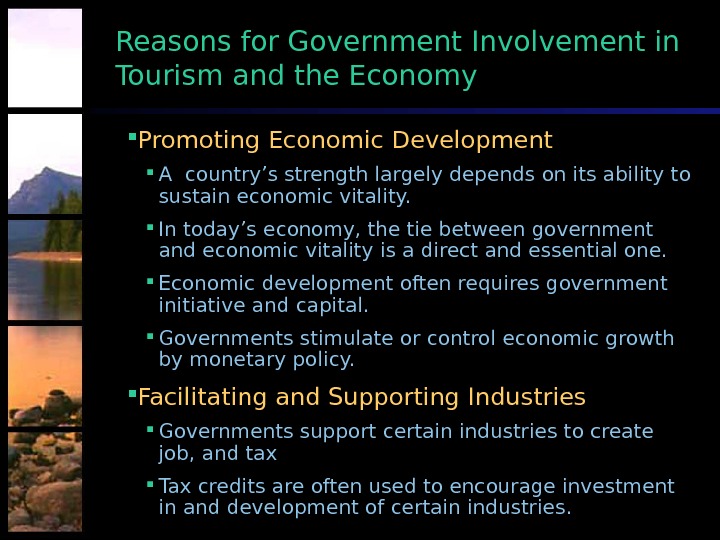
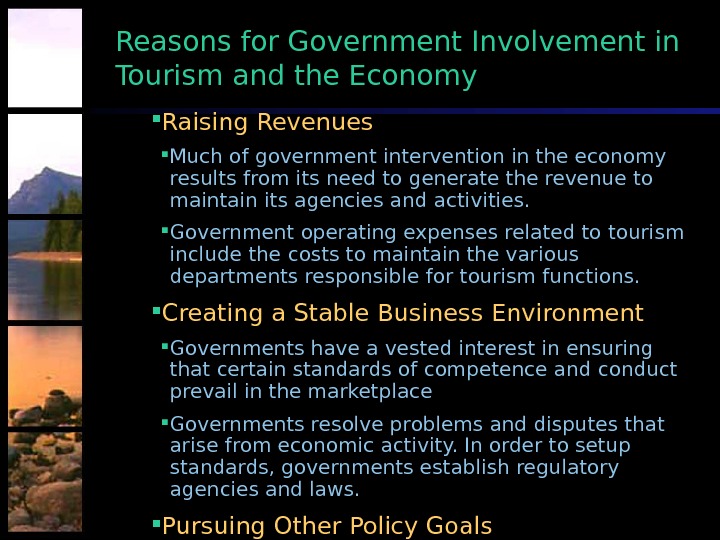
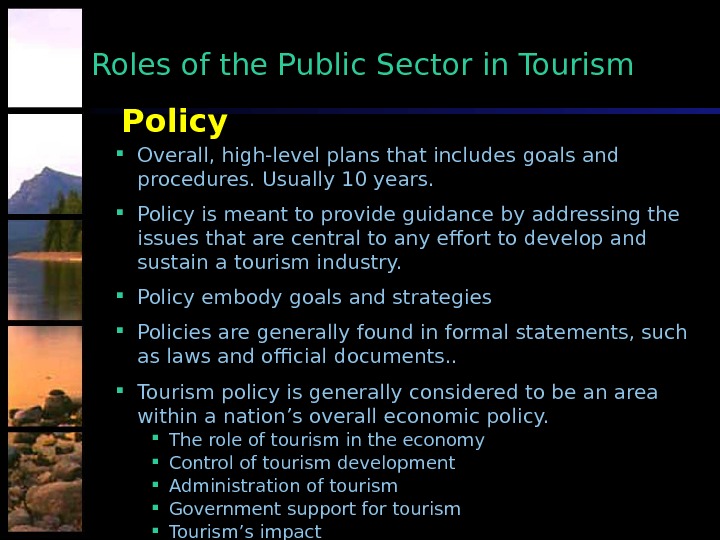
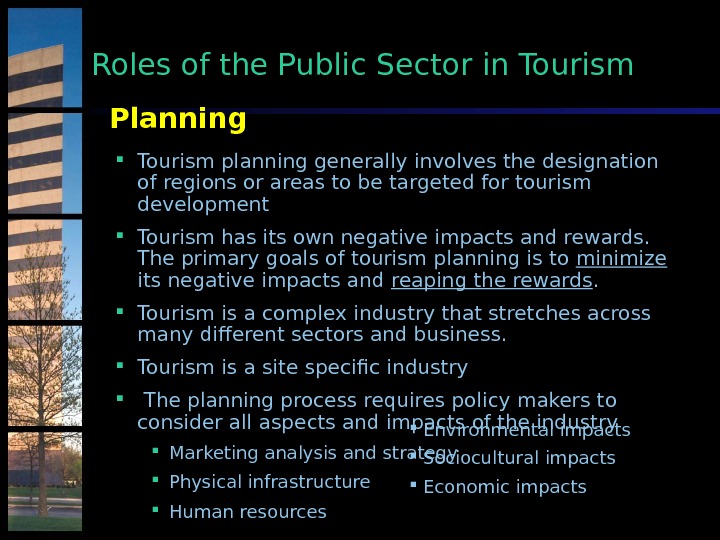
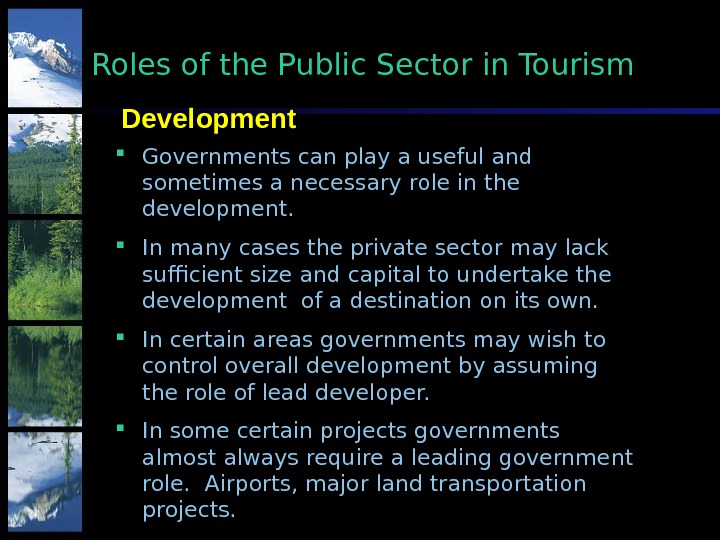
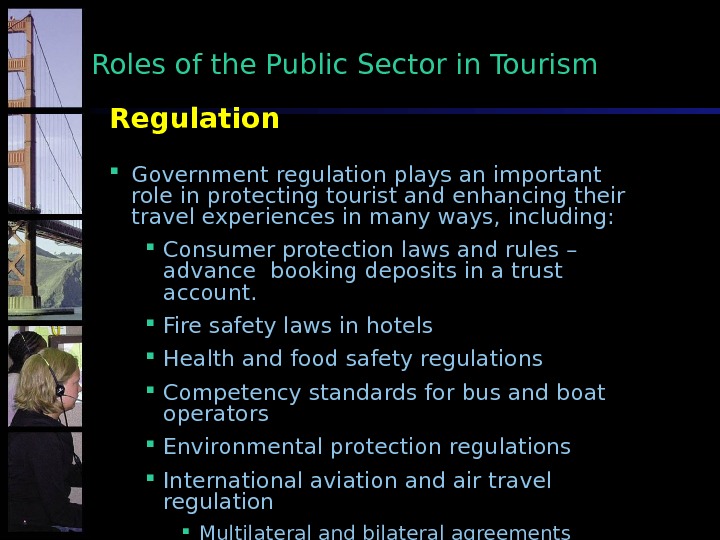
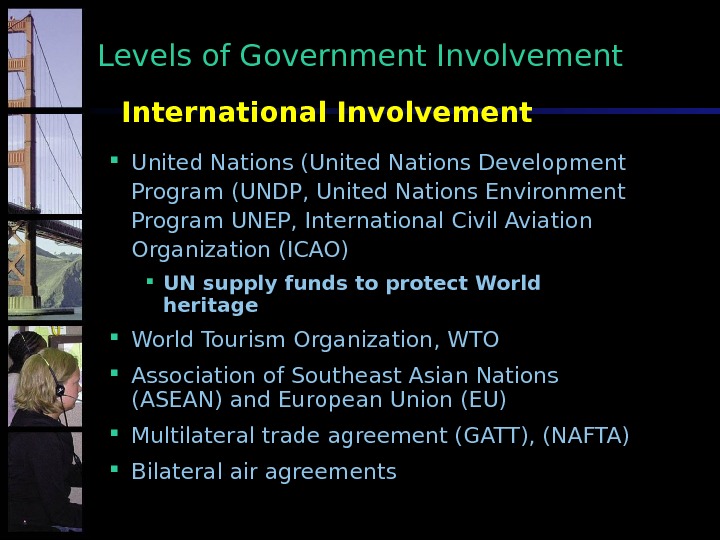
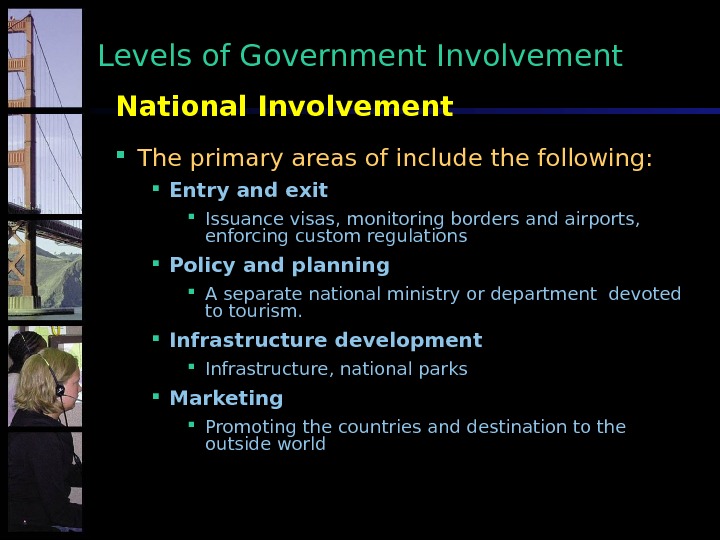
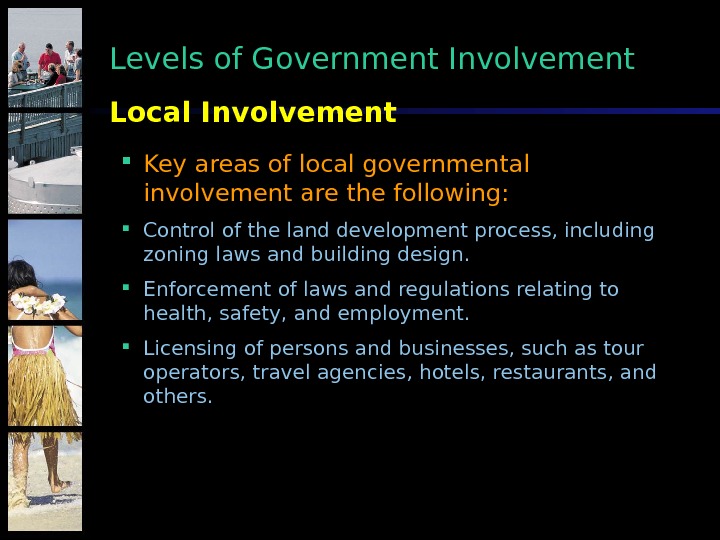
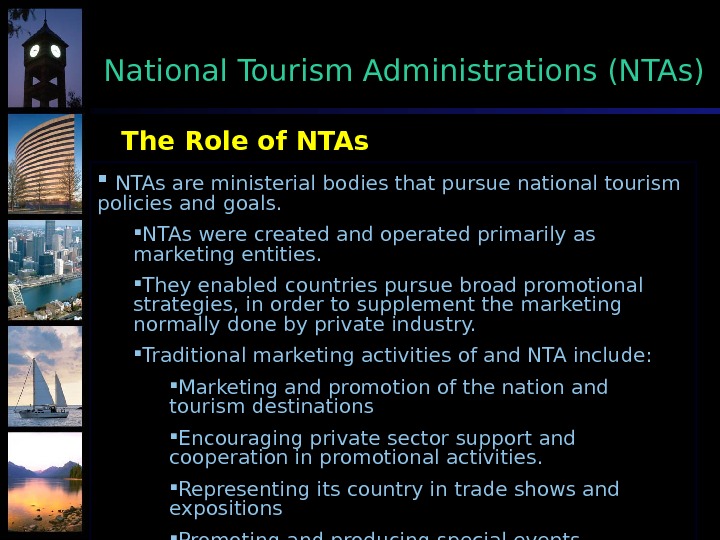
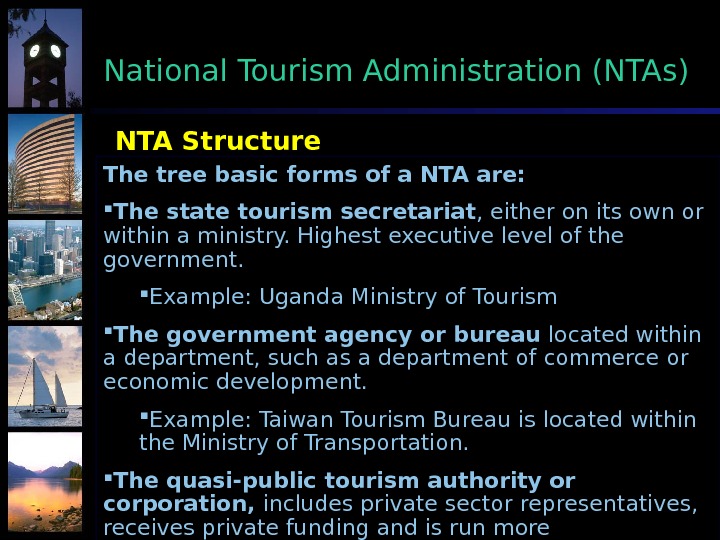
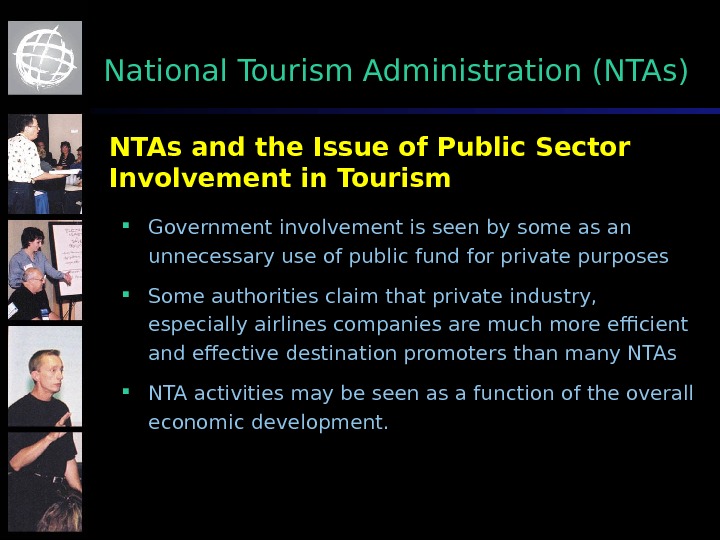

- Размер: 1.6 Mегабайта
- Количество слайдов: 16
Описание презентации Lecture 12 The Role of Government in Tourism по слайдам
 Lecture 12 The Role of Government in Tourism Policy
Lecture 12 The Role of Government in Tourism Policy
 The Role of Government in Tourism The Role of Government involvement – Tourism, like any other economic activity, takes place in an environment that is shaped by many different forces. Complex policies, laws, regulations, and other actions. National and International forces – Tourism is comprised of industries and activities that stretch not only across nations and regions, but across traditional lines of business and industry as well. International regulations – International tourism relies on a high degree of communication and cooperation among nations with respect to this complex network of laws, regulations, and policies.
The Role of Government in Tourism The Role of Government involvement – Tourism, like any other economic activity, takes place in an environment that is shaped by many different forces. Complex policies, laws, regulations, and other actions. National and International forces – Tourism is comprised of industries and activities that stretch not only across nations and regions, but across traditional lines of business and industry as well. International regulations – International tourism relies on a high degree of communication and cooperation among nations with respect to this complex network of laws, regulations, and policies.
 Government Involvement in Tourism Alpina USA A skier who wants to visit Alpina 1. Alpina’s foreign visitors policy 2. Political and trade relations between USA 3. Bilateral air agreement s 4. Where to stay and visit 5. Skier will pay many direct and indirect taxes. Tourism-related laws, regulations, and restrictions will have a great impact of tourism activities. An Imaginative country of Alpina Cuba, Libya, North Korea
Government Involvement in Tourism Alpina USA A skier who wants to visit Alpina 1. Alpina’s foreign visitors policy 2. Political and trade relations between USA 3. Bilateral air agreement s 4. Where to stay and visit 5. Skier will pay many direct and indirect taxes. Tourism-related laws, regulations, and restrictions will have a great impact of tourism activities. An Imaginative country of Alpina Cuba, Libya, North Korea
 Reasons for Government Involvement in Tourism and the Economy Promoting Economic Development A country’s strength largely depends on its ability to sustain economic vitality. In today’s economy, the tie between government and economic vitality is a direct and essential one. Economic development often requires government initiative and capital. Governments stimulate or control economic growth by monetary policy. Facilitating and Supporting Industries Governments support certain industries to create job, and tax Tax credits are often used to encourage investment in and development of certain industries.
Reasons for Government Involvement in Tourism and the Economy Promoting Economic Development A country’s strength largely depends on its ability to sustain economic vitality. In today’s economy, the tie between government and economic vitality is a direct and essential one. Economic development often requires government initiative and capital. Governments stimulate or control economic growth by monetary policy. Facilitating and Supporting Industries Governments support certain industries to create job, and tax Tax credits are often used to encourage investment in and development of certain industries.
 Raising Revenues Much of government intervention in the economy results from its need to generate the revenue to maintain its agencies and activities. Government operating expenses related to tourism include the costs to maintain the various departments responsible for tourism functions. Creating a Stable Business Environment Governments have a vested interest in ensuring that certain standards of competence and conduct prevail in the marketplace Governments resolve problems and disputes that arise from economic activity. In order to setup standards, governments establish regulatory agencies and laws. Pursuing Other Policy Goals Governments intervene in business activity to achieve broader policy goals, such as employment, education and training and environmental protection. Reasons for Government Involvement in Tourism and the Economy
Raising Revenues Much of government intervention in the economy results from its need to generate the revenue to maintain its agencies and activities. Government operating expenses related to tourism include the costs to maintain the various departments responsible for tourism functions. Creating a Stable Business Environment Governments have a vested interest in ensuring that certain standards of competence and conduct prevail in the marketplace Governments resolve problems and disputes that arise from economic activity. In order to setup standards, governments establish regulatory agencies and laws. Pursuing Other Policy Goals Governments intervene in business activity to achieve broader policy goals, such as employment, education and training and environmental protection. Reasons for Government Involvement in Tourism and the Economy
 Overall, high-level plans that includes goals and procedures. Usually 10 years. Policy is meant to provide guidance by addressing the issues that are central to any effort to develop and sustain a tourism industry. Policy embody goals and strategies Policies are generally found in formal statements, such as laws and official documents. . Tourism policy is generally considered to be an area within a nation’s overall economic policy. The role of tourism in the economy Control of tourism development Administration of tourism Government support for tourism Tourism’s impact. Roles of the Public Sector in Tourism Policy
Overall, high-level plans that includes goals and procedures. Usually 10 years. Policy is meant to provide guidance by addressing the issues that are central to any effort to develop and sustain a tourism industry. Policy embody goals and strategies Policies are generally found in formal statements, such as laws and official documents. . Tourism policy is generally considered to be an area within a nation’s overall economic policy. The role of tourism in the economy Control of tourism development Administration of tourism Government support for tourism Tourism’s impact. Roles of the Public Sector in Tourism Policy
 Planning Tourism planning generally involves the designation of regions or areas to be targeted for tourism development Tourism has its own negative impacts and rewards. The primary goals of tourism planning is to minimize its negative impacts and reaping the rewards. Tourism is a complex industry that stretches across many different sectors and business. Tourism is a site specific industry The planning process requires policy makers to consider all aspects and impacts of the industry Marketing analysis and strategy Physical infrastructure Human resources. Roles of the Public Sector in Tourism Environmental impacts Sociocultural impacts Economic impacts
Planning Tourism planning generally involves the designation of regions or areas to be targeted for tourism development Tourism has its own negative impacts and rewards. The primary goals of tourism planning is to minimize its negative impacts and reaping the rewards. Tourism is a complex industry that stretches across many different sectors and business. Tourism is a site specific industry The planning process requires policy makers to consider all aspects and impacts of the industry Marketing analysis and strategy Physical infrastructure Human resources. Roles of the Public Sector in Tourism Environmental impacts Sociocultural impacts Economic impacts
 Development. Roles of the Public Sector in Tourism Governments can play a useful and sometimes a necessary role in the development. In many cases the private sector may lack sufficient size and capital to undertake the development of a destination on its own. In certain areas governments may wish to control overall development by assuming the role of lead developer. In some certain projects governments almost always require a leading government role. Airports, major land transportation projects.
Development. Roles of the Public Sector in Tourism Governments can play a useful and sometimes a necessary role in the development. In many cases the private sector may lack sufficient size and capital to undertake the development of a destination on its own. In certain areas governments may wish to control overall development by assuming the role of lead developer. In some certain projects governments almost always require a leading government role. Airports, major land transportation projects.
 Regulation Government regulation plays an important role in protecting tourist and enhancing their travel experiences in many ways, including: Consumer protection laws and rules – advance booking deposits in a trust account. Fire safety laws in hotels Health and food safety regulations Competency standards for bus and boat operators Environmental protection regulations International aviation and air travel regulation Multilateral and bilateral agreements. Roles of the Public Sector in Tourism
Regulation Government regulation plays an important role in protecting tourist and enhancing their travel experiences in many ways, including: Consumer protection laws and rules – advance booking deposits in a trust account. Fire safety laws in hotels Health and food safety regulations Competency standards for bus and boat operators Environmental protection regulations International aviation and air travel regulation Multilateral and bilateral agreements. Roles of the Public Sector in Tourism
 International Involvement United Nations (United Nations Development Program (UNDP, United Nations Environment Program UNEP, International Civil Aviation Organization (ICAO) UN supply funds to protect World heritage World Tourism Organization, WTO Association of Southeast Asian Nations (ASEAN) and European Union (EU) Multilateral trade agreement (GATT), (NAFTA) Bilateral air agreements. Levels of Government Involvement
International Involvement United Nations (United Nations Development Program (UNDP, United Nations Environment Program UNEP, International Civil Aviation Organization (ICAO) UN supply funds to protect World heritage World Tourism Organization, WTO Association of Southeast Asian Nations (ASEAN) and European Union (EU) Multilateral trade agreement (GATT), (NAFTA) Bilateral air agreements. Levels of Government Involvement
 National Involvement The primary areas of include the following: Entry and exit Issuance visas, monitoring borders and airports, enforcing custom regulations Policy and planning A separate national ministry or department devoted to tourism. Infrastructure development Infrastructure, national parks Marketing Promoting the countries and destination to the outside world Levels of Government Involvement
National Involvement The primary areas of include the following: Entry and exit Issuance visas, monitoring borders and airports, enforcing custom regulations Policy and planning A separate national ministry or department devoted to tourism. Infrastructure development Infrastructure, national parks Marketing Promoting the countries and destination to the outside world Levels of Government Involvement
 Key areas of local governmental involvement are the following: Control of the land development process, including zoning laws and building design. Enforcement of laws and regulations relating to health, safety, and employment. Licensing of persons and businesses, such as tour operators, travel agencies, hotels, restaurants, and others. Local Involvement Levels of Government Involvement
Key areas of local governmental involvement are the following: Control of the land development process, including zoning laws and building design. Enforcement of laws and regulations relating to health, safety, and employment. Licensing of persons and businesses, such as tour operators, travel agencies, hotels, restaurants, and others. Local Involvement Levels of Government Involvement
 The Role of NTAs are ministerial bodies that pursue national tourism policies and goals. NTAs were created and operated primarily as marketing entities. They enabled countries pursue broad promotional strategies, in order to supplement the marketing normally done by private industry. Traditional marketing activities of and NTA include: Marketing and promotion of the nation and tourism destinations Encouraging private sector support and cooperation in promotional activities. Representing its country in trade shows and expositions Promoting and producing special events Promoting and contracting for market research analysis. Maintaining overseas tourism information offices. National Tourism Administrations (NTAs)
The Role of NTAs are ministerial bodies that pursue national tourism policies and goals. NTAs were created and operated primarily as marketing entities. They enabled countries pursue broad promotional strategies, in order to supplement the marketing normally done by private industry. Traditional marketing activities of and NTA include: Marketing and promotion of the nation and tourism destinations Encouraging private sector support and cooperation in promotional activities. Representing its country in trade shows and expositions Promoting and producing special events Promoting and contracting for market research analysis. Maintaining overseas tourism information offices. National Tourism Administrations (NTAs)
 The tree basic forms of a NTA are: The state tourism secretariat , either on its own or within a ministry. Highest executive level of the government. Example: Uganda Ministry of Tourism The government agency or bureau located within a department, such as a department of commerce or economic development. Example: Taiwan Tourism Bureau is located within the Ministry of Transportation. The quasi-public tourism authority or corporation, includes private sector representatives, receives private funding and is run more independently of the government. National Tourism Administration (NTAs) NTA Structure
The tree basic forms of a NTA are: The state tourism secretariat , either on its own or within a ministry. Highest executive level of the government. Example: Uganda Ministry of Tourism The government agency or bureau located within a department, such as a department of commerce or economic development. Example: Taiwan Tourism Bureau is located within the Ministry of Transportation. The quasi-public tourism authority or corporation, includes private sector representatives, receives private funding and is run more independently of the government. National Tourism Administration (NTAs) NTA Structure
 NTAs and the Issue of Public Sector Involvement in Tourism Government involvement is seen by some as an unnecessary use of public fund for private purposes Some authorities claim that private industry, especially airlines companies are much more efficient and effective destination promoters than many NTAs NTA activities may be seen as a function of the overall economic development. National Tourism Administration (NTAs)
NTAs and the Issue of Public Sector Involvement in Tourism Government involvement is seen by some as an unnecessary use of public fund for private purposes Some authorities claim that private industry, especially airlines companies are much more efficient and effective destination promoters than many NTAs NTA activities may be seen as a function of the overall economic development. National Tourism Administration (NTAs)
 END OF LECTUR
END OF LECTUR

